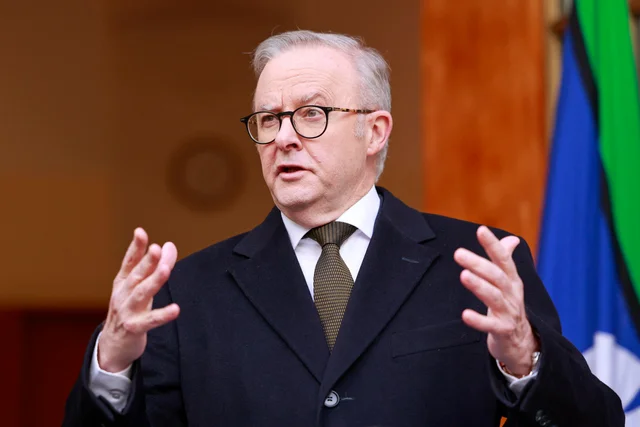In a landmark foreign policy shift, the Prime Minister of Australia Will Recognize Palestinian State: PM of Australia joining a growing list of nations that have taken similar steps in recent years. The announcement, which came during a press briefing in Canberra, is being described as a historic moment in Australia’s diplomatic history and a significant statement of support for the Palestinian people’s right to self-determination.
A Shift in Policy
For decades, Australia had maintained a cautious position on the Israeli-Palestinian conflict, supporting a two-state solution in principle but stopping short of formal recognition of Palestine as a sovereign state. The latest decision marks a major change, signaling that Australia is ready to play a more active role in promoting peace and justice in the region.
The Prime Minister stated that the move was based on “Australia’s commitment to international law, human rights, and the peaceful resolution of conflicts.” He emphasized that recognizing Palestine does not mean abandoning Australia’s relationship with Israel but rather aligning its foreign policy with what Canberra views as a necessary step towards a lasting peace.
International Context
Australia’s announcement comes at a time when several countries — including the United Kingdom, Ireland, Norway, Spain, and others — have recently declared their recognition of Palestine. These recognitions have added momentum to global calls for Israel and Palestine to restart meaningful peace negotiations under international mediation.
The Prime Minister pointed out that Australia’s recognition is intended to contribute to a “balanced approach” that respects the legitimate aspirations of both Israelis and Palestinians. He stressed that the decision should not be interpreted as taking sides in the ongoing conflict but as supporting the framework that has long been endorsed by the United Nations: two states living side by side in peace and security.
Diplomatic Reactions
The decision has already sparked strong reactions worldwide. Palestinian leaders welcomed the announcement, calling it a moral and political victory. The Palestinian Authority released a statement expressing gratitude to the Australian government and people for “standing on the right side of history.” Palestinian diplomats have also expressed hope that Australia’s move will inspire other countries, particularly in the Asia-Pacific region, to follow suit.
Israel, however, reacted sharply, with the Israeli government summoning Australia’s ambassador in Tel Aviv for an explanation. Israeli officials argued that such recognition could “reward unilateral actions” by the Palestinian leadership and undermine peace efforts. Nonetheless, Australian officials maintained that recognition was fully consistent with encouraging negotiations, not replacing them.
Domestic Debate in Australia
The move has stirred debate within Australia’s political landscape. While the ruling party and several opposition figures have praised the decision as a step towards justice and peace, some critics have argued that it could strain Australia’s traditionally strong ties with Israel.
Pro-Palestinian advocacy groups in Australia have hailed the decision, holding rallies in major cities to celebrate the announcement. Meanwhile, pro-Israel organizations have expressed disappointment, urging the government to focus instead on fostering dialogue between the two sides without preconditions.
Why Now?
Analysts believe several factors influenced Australia’s timing. The ongoing humanitarian crisis in Gaza, international condemnation of continued settlement expansion in the West Bank, and the growing recognition of Palestine by other Western nations have created a political environment where inaction risked appearing out of step with global trends.
Moreover, the Prime Minister’s recent visits to key allies in Europe reportedly included discussions on coordinated recognition strategies, ensuring that Australia’s decision would carry greater diplomatic weight as part of a collective effort.
Impact on the Peace Process
Supporters of the decision argue that formal recognition strengthens the Palestinian position in future peace talks, giving them a more equal footing with Israel. Critics fear it could harden positions on both sides, making compromise more difficult.
However, Australian officials have clarified that recognition does not mean endorsing specific borders for the Palestinian state. Instead, Canberra supports borders based on pre-1967 lines with mutually agreed land swaps — a position consistent with past United Nations resolutions.
Looking Forward
Australia plans to open a representative office in Ramallah, the administrative capital of the Palestinian Authority, within the next year. The office will serve as a diplomatic mission and as a platform for development cooperation, trade promotion, and cultural exchange between Australia and Palestine.
In addition, the Australian government has pledged increased humanitarian aid to Palestinian communities, particularly in Gaza and the West Bank, to address urgent needs in health, education, and infrastructure.X
Global Significance
Australia’s recognition is being seen as a major development in the Asia-Pacific region’s approach to the Israeli-Palestinian conflict. While several countries in the region have historically avoided taking firm positions, Australia’s move could encourage others to adopt clearer stances.
International observers believe that such recognitions send a strong message to the global community about the urgency of resolving one of the world’s longest-standing conflicts. By aligning itself with the growing bloc of nations advocating for Palestinian statehood, Australia has positioned itself as an active player in shaping the conversation around Middle East peace.
Conclusion
The Prime Minister’s declaration that Australia will recognize the State of Palestine marks a defining moment in the country’s foreign policy. While the decision has been met with both praise and criticism, it undeniably signals Australia’s willingness to align its diplomatic stance with principles of self-determination and peaceful coexistence. READ NEXT https://elevenpakistan.com/pakistan-stock-market-surges-past-147000-points/
As the world watches how this move impacts Australia’s relationships in the Middle East and beyond, one thing is clear: the recognition of Palestine has brought renewed attention to the urgent need for a fair and lasting solution to the Israeli-Palestinian conflict — one that respects the rights, dignity, and security of both peoples.
READ MORE



